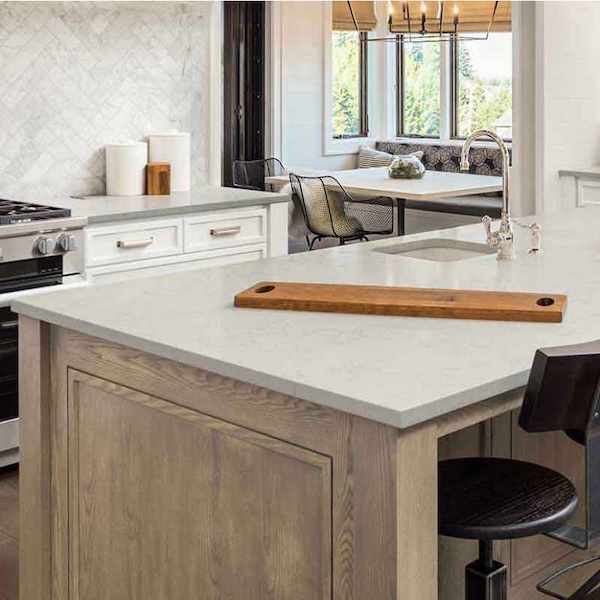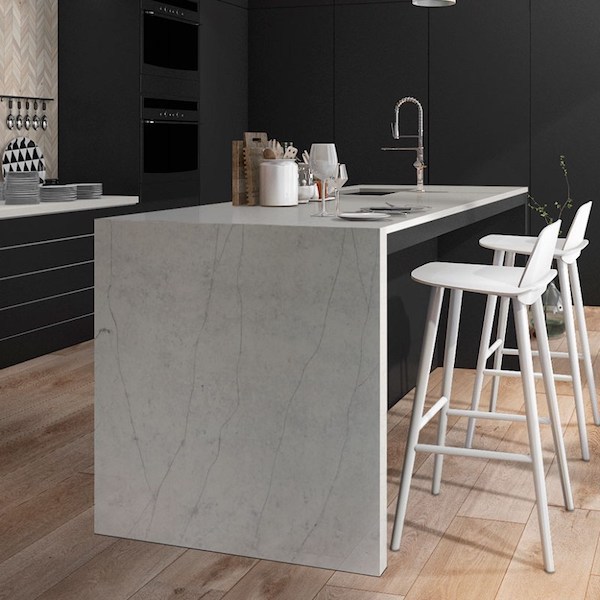Which Is Better For Your Kitchen — Marble Or Quartz Countertops?
August 21, 2020
If you’ve narrowed down the choice for your new kitchen countertop to marble vs. quartz, you’ve already decided that a luxury material is the way to go. An upscale, designer-look slab countertop creates the look of prestige and elegance, that much is certain! It’s not an easy decision, though, and you’ll need to ask a few more questions before choosing marble or quartz countertops for your home.
Before discussing the pros and cons of each material, let’s go back to basics about each choice. If you fully understand the composition of marble and quartz, and the color options available for each one, you’ll feel a lot more confident in your final decision.
Marble
Marble has been valued as a construction material, as well as a surface veneer, for thousands of years. It’s a metamorphic rock created when limestone is exposed to high pressure and temperature. It it sourced from locations all over the world — Carrara marble from Italy is one of the best-known types of marble, but it is also mined in Greece, Spain, Russia, and the United States, as well as other locations. The varying colors of marble are created from mineral impurities, and different colors are found in different locations. Most marble countertops are light colored, but you can also find pink, green, blue-gray, and even black. Marble’s cost is dependent on two factors: how rare it is, and how far it has been transported.

Quartz
While marble is quarried from the earth, quartz countertops are engineered slabs. Quartz crystals are mined from the earth, however. It’s one of the earth’s most abundant minerals, so it’s readily available, reducing its environmental impact as compared to other natural stones. The crystals are blended with other minerals and pigments, which create the unique, beautiful quartz countertop colors and patterns. These are bound together with a polymer resin. This mixture is then molded, pressed, cured, and polished, The result is an extremely durable surface that is completely waterproof, stain- and scratch-resistant, and never needs sealing. Because it is an engineered surface, it is available in an astonishing variety of colors and patterns. Quartz countertops are even manufactured to authentically replicate marble as well as other popular countertop materials.
Neither marble nor quartz is going to be the perfect countertop material for everyone. There are several other factors involved in the decision between the two, and each have pros and cons. Here are some of the reasons homeowners choose one over the other.
Etching: Because marble is composed of calcium carbonate, it is alkaline and will react to acids such as vinegar and lemon juice by fizzing. When acidic liquids contact marble countertops, it can result in etching, creating a dull spot in a polished surface. This can be minimized by choosing a honed, matte surface to start with, and by regular application of a protective sealer. With quartz, this will never be an issue.
Staining and Discoloration: Marble, like all natural stone, needs regular sealing to maintain its resistance to liquid, and therefore to being stained. Spaghetti sauce, red wine, coffee, and other foods are notorious for leaving their mark on a marble surface. This is especially problematic with white marble countertops, and perhaps less noticeable on other colors. Since quartz is totally waterproof, it is much more stain-resistant.

Maintenance: While many homeowners insist the labor involved in maintaining marble is worthwhile, it’s going to need special care. Marble must be sealed regularly, at least once a year, depending on its color and finish. It should be cleaned with either plain water, a mild soap, or a cleanser specially formulated for use on marble. Quartz, on the other hand, does not need sealing and while it’s best to avoid harsh chemicals, no special cleansers are required.
Return on Investment: It’s commonly known that a marble countertop adds value to the home and can increase its resale value. This is true whether the luxury countertops are installed in the kitchen or the bathroom, and also if you’re considering marble or quartz vs. granite. However, as quartz continues to grow in popularity, more home buyers are familiar with its beauty and durability. It is also considered a luxury countertop, and may even add more value to the home than natural stone because of its easy care.
Variety of Finishes: Marble is available in a wide variety of finishes: honed, polished, brushed, and leathered. The one you choose depends on whether you want a shiny, glossy countertop, a more matte look, or a countertop with some texture. Quartz countertops are currently available in fewer finish options, just polished and matte.
Cost: Marble is generally more expensive than quartz, although they are both considered high-end, luxury products. Some of the more common, readily available marble colors may be nearly the same price as quartz alternatives. However, the price of a marble slab increases depending on its country of origin, availability, and quality.
Personal Preferences: Although marble and quartz countertops have much in common and are both beautiful, durable, and elegant, many homeowners may have their heart set on a natural stone slab countertop. Because of its ability to remain a constant temperature, marble is considered better for baking, and is a favorite countertop for ice cream parlors. Chefs tend to appreciate quartz countertops, though, because of their strength. Quartz is harder than marble, so it’s more likely to resist scratches. With a quartz countertop, you need not worry about spilling sauce or splashing liquid.
There is no one perfect countertop material — that is why many different natural stone and engineered quartz countertops are available. Keep in mind that quartz counters can resemble a variety of natural stones, so if you’ve got your heart set on a white Carrara marble countertop, there’s a quartz alternative that’s hard to tell apart. The one you choose depends on many factors, such as your lifestyle and décor.
More on Quartz Compared to Marble
Why Choose Quartz Countertops Over Marble
Thinking About Marble? Consider A Quartz Countertop First!
Are Quartz Countertops Better Than Marble?
Are Quartz Countertops More Durable Than Marble?
